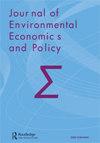The effects of income inequality on the willingness to contribute to environmental sustainability
IF 1.2
Q3 ENVIRONMENTAL STUDIES
Journal of Environmental Economics and Policy
Pub Date : 2021-10-01
DOI:10.1080/21606544.2021.1981460
引用次数: 0
Abstract
ABSTRACT Over the last years, the impact of social inequality in various fields was analysed and researched. Surprisingly, preceding research on the correlation between income inequality and environmental pollution revealed no evidence for such a connection. In this paper, we break down the effect of income inequality on the individuals’ willingness to contribute to environmental sustainability into two indirect effects: the growing privatization of public costs and the expansion of social conflicts. Analysing data from an ISSP survey from 2010, we conclude that the lack of statistical correlation between income inequality and the willingness to contribute to environmental protection results from the simultaneous occurrence of two opposite forces of equal strength: With higher inequality, a person perceives the costs of environmental damage as a private problem, thereby his/her willingness to contribute to the protection of the environment rises. On the other hand, with higher inequality, the willingness to contribute is less enhanced by a norm of contributing to environmental sustainability.收入不平等对环境可持续性贡献意愿的影响
近年来,人们对社会不平等在各个领域的影响进行了分析和研究。令人惊讶的是,之前关于收入不平等和环境污染之间关系的研究并没有发现这种联系的证据。在本文中,我们将收入不平等对个人环境可持续性贡献意愿的影响分解为两种间接影响:公共成本日益私有化和社会冲突的扩大。通过对2010年ISSP调查数据的分析,我们得出结论,收入不平等与环境保护意愿之间缺乏统计相关性的原因是两种强度相等的相反力量同时出现:在收入不平等加剧的情况下,一个人将环境破坏的成本视为一个私人问题,因此他/她为环境保护做出贡献的意愿会上升。另一方面,在不平等程度较高的情况下,为环境可持续性做出贡献的规范对捐款意愿的增强作用较小。
本文章由计算机程序翻译,如有差异,请以英文原文为准。
求助全文
约1分钟内获得全文
求助全文
来源期刊

Journal of Environmental Economics and Policy
ENVIRONMENTAL STUDIES-
CiteScore
4.70
自引率
7.70%
发文量
26
 求助内容:
求助内容: 应助结果提醒方式:
应助结果提醒方式:


